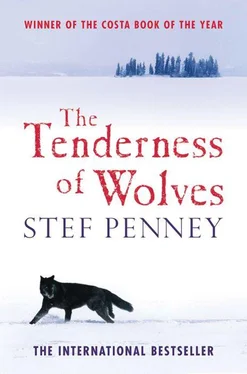She holds my lack of living natural children as a sign of failure to do my immigrant duty, which is, apparently, to raise a workforce large enough to run a farm without hiring outside help. A common enough response in such a vast, underpopulated country. I sometimes think that the settlers reproduce so heroically as a terrified response to the size and emptiness of the land, as though they could hope to fill it with their offspring. Or maybe they are afraid that a child can slip away so easily, they must always have more. Maybe they are right.
When I got back to the house this afternoon Angus was back. I told him about Jammet’s death, and he examined his pipe for a long time, as he does when he is deep in thought. I found myself close to tears, although I did not know Jammet well. Angus knew him better; had gone hunting with him on occasion. But I could not read the currents moving under his skin. Later we sat in the kitchen at our usual places, eating in silence. Between us, on the south side of the table, another place was set. Neither of us referred to it.
Many years ago, my husband took a trip back east. He was gone for three weeks, after which he sent a telegram saying to expect him back on the Sunday. We had not spent a night apart in four years, and I looked forward keenly to his return. When I heard the rumble of wheels on the road, I ran to meet him, then saw, puzzled, that there were two people in the cart. As the cart came closer I saw that it was a child of about five years, a girl. Angus pulled up the pony and I ran towards them, my heart beating thickly in my throat. The girl was asleep, long lashes lying on her sallow cheeks. Her hair was black. Her eyebrows were black. Purple veins showed through her eyelids. She was beautiful. And I couldn’t speak. I just stared.
‘The French Sisters had them. Their parents died of plague. I heard about it and went to the convent. There were all these children. I tried to get one who would be the right age, but …’ He trailed off. Our infant daughter had died the year before. ‘But she was the bonniest.’ He took a deep breath. ‘We could call her Olivia. I don’t know if you’d want to, or …’
I threw my arms round his neck and suddenly found that my face was wet. He held me tight, and then the child opened her eyes.
‘My name is Frances,’ she said in a noticeable Irish brogue. She had a sharp look about her with her eyes open; alert.
‘Hello Frances,’ I said, nervous. What if she didn’t like us?
‘Are you going to be my Mama?’ she asked.
I felt my face go hot as I nodded. She went quiet after that. We took her inside and I made the nicest dinner I could muster–whitefish and vegetables and tea with lots of sugar, although she didn’t eat much, and stared at the fish as though she wasn’t sure what it was. She didn’t say another word, her dark blue eyes flickering from one of us to the other. She was exhausted. I picked her up in my arms and carried her upstairs. The sensation of holding this hot, limp body made me tremble with feeling. Her bones felt fragile under my hands and she smelt stale, like an unaired room. Since she was almost asleep I just took off the dress, shoes and socks, and tucked a blanket around her. I watched as she twitched in her sleep.
Frances’s parents had arrived at Belle Isle aboard a packet ship called the Sarah . The steerage was packed with Irish from County Mayo, which was still suffering after the potato famine. Like those people who catch onto a fad long after it has gone out of fashion, they developed typhus fever on board, although the worst of the epidemics had subsided. Nearly a hundred men, women and children died on that ship, which sank on its return journey to Liverpool. Several children were orphaned and had been taken to the nunnery until they could be found homes.
The next morning I went to the spare room to find Frances still asleep, although when I touched her shoulder gently I had the impression that she was pretending. I realised she was scared; perhaps she had heard terrible stories about Canadian farmers and thought we were going to treat her as a slave. Smiling at her, I took her hand and led her downstairs to where I’d prepared a tub of hot water in front of the stove. She kept her eyes on the floor as she lifted her arms for me to peel off the long petticoat.
I ran out of the house, looking for Angus, who was splitting wood at the corner of the house.
‘Angus,’ I hissed, feeling angry and stupid at the same time.
He turned round, axe in hand, frowning at me, puzzled. ‘Is something wrong? Is she all right?’
I shook my head to the first question. It occurred to me that he knew, yet I instantly dismissed the idea. Used to me, he turned back to the log; down came the axe; neat halves span into the log basket.
‘Angus, you got a boy.’
He put the axe down. He didn’t know. We went back inside to where the child was playing idly with the soap in the bathtub, letting it pop up through his fingers. His eyes were large and wary. He wasn’t surprised to see us staring at him.
‘Do you want me to go back?’ he asked.
‘No, of course not.’ I knelt beside him and took the soap from his hands. The shoulder blades stuck out like wing stumps on his skeletal back.
‘Let me.’ I took the soap and began to wash him, hoping my hands would tell him more than words that it didn’t matter. Angus went back to the woodpile, and let the door bang behind him.
Francis never seemed surprised that he had come to us dressed as a girl. We pondered for hours over the French Sisters’ motives–did they think a girl would find a home more easily than a boy? Yet there had been boys in the group of orphans. Had they simply not noticed, been blinded by the beauty of his face, and dressed him in the clothes that seemed to suit it best? Francis himself didn’t offer an explanation, or express any shame; nor did he offer resistance when I made him some trousers and shirts and cut off his long hair.
He thinks we never forgave him for it, but that’s not so with me. With my husband though, I’m not sure. A Highlander through and through, he doesn’t like to be made a fool of, and I don’t know that he ever recovered from the shock. It was all right when Francis was a child. He could be very funny, clowning and mimicking. But we all got older, and things changed, as they always seem to, for the worse. He grew into a youth who never seemed to fit with the others. I watched him try to be stoic and tough, to cultivate a foolhardy courage and that casual disrespect for danger that is common currency in the backwoods. To be a man you have to be brave and enduring, to make light of pain and hardship. Never complain. Never falter. I saw him fail. We should have lived in Toronto, or New York, then maybe it wouldn’t have mattered. But what pass for heroics in a softer world are daily chores here. He stopped trying to be like the others; he became surly and taciturn, no longer responded to affection, wouldn’t touch me.
Now he is seventeen. His Irish accent is quite gone, but in some ways he is as much a stranger as ever. He looks like the changeling he is; they say there is Spanish blood in some Irish, and to look at Francis you would believe it–he is as dark as Angus and I are fair. Ann Pretty once made a laboured joke that he had come to us from a plague, and had become our own personal plague. I was furious with her (she laughed at me, of course), but the words stuck and barge out of my memory whenever Francis is storming through the house, slamming doors and grunting as if he were barely able to speak. I have to remind myself of my own youth and bite my tongue. My husband is less tolerant. They can go for days on end without a good word passing between them.
That is why I was afraid to tell Angus that I have not seen Francis since the day before. Still, I resent him for not asking. Soon it will be morning and our son has not been home for forty-eight hours. He has done this before–he will go on solitary fishing trips that last for two or three days, and return, usually without fish and with barely a word about what he has done. I suspect that he hates to kill anything; the fishing is just a cloak for his desire to be alone.
Читать дальше












